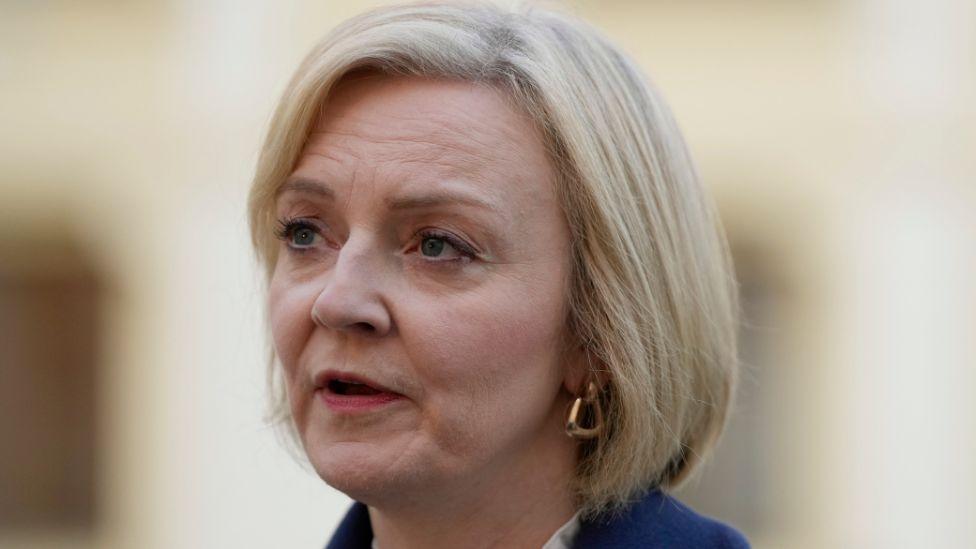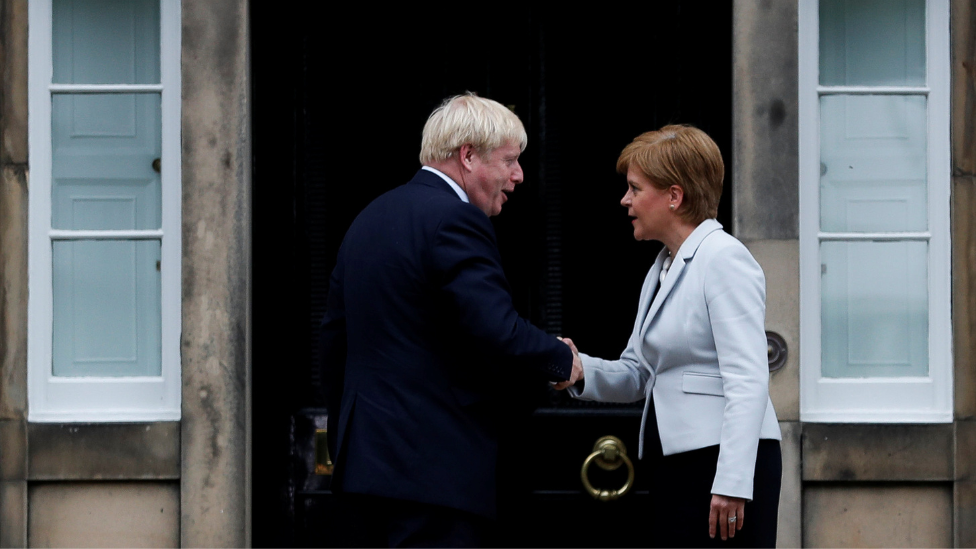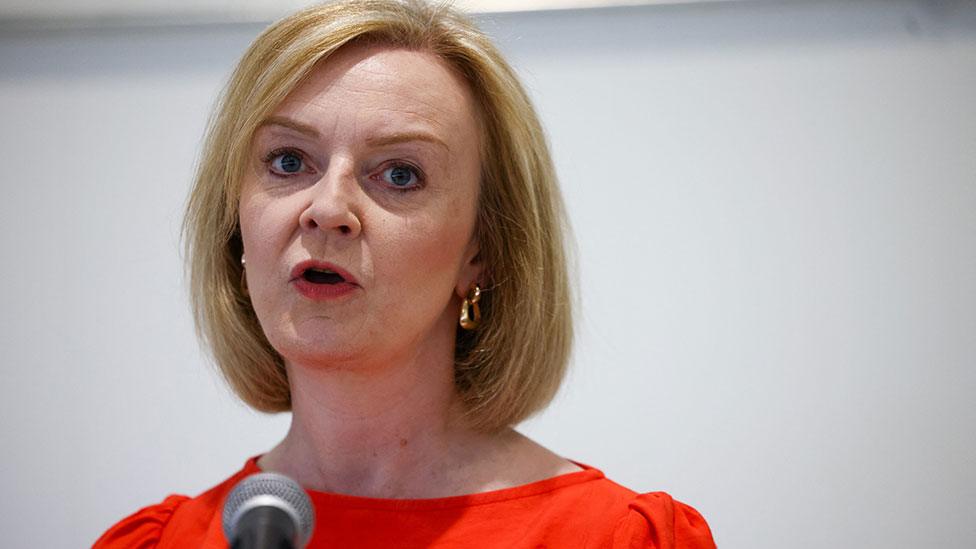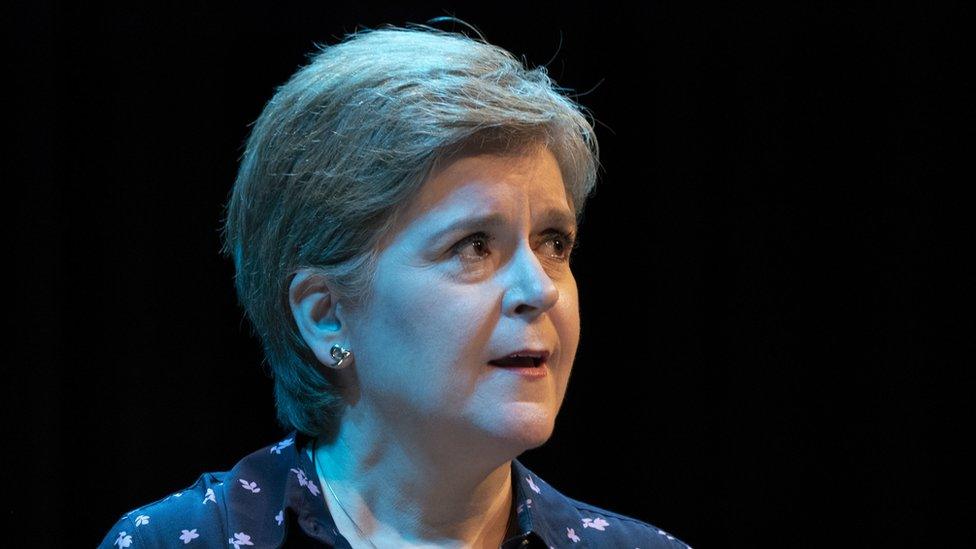Nicola Sturgeon says lack of contact from Liz Truss 'absurd'
- Published
Scotland's first minister says it is "absurd" the new prime minister has not contacted her
Scotland's first minister has said she has still not had a phone call with Liz Truss more than a month after she became prime minister.
Nicola Sturgeon told the BBC it was "absurd" and "unprecedented" that she had yet to hear from the new PM.
Ms Sturgeon had talks with Theresa May and Boris Johnson within days of them being appointed.
Ms Truss branded Ms Sturgeon as an "attention seeker" who was best ignored during the Tory leadership contest.
Speaking to BBC political editor Chris Mason ahead of the SNP conference in Aberdeen, Ms Sturgeon said that other than "an exchange or two" between the two leaders at events following the death of the Queen, there had been no formal contact.
She added: "I don't know whether that is arrogance, lack of respect or insecurity or whatever it is. It's not the right way to do government in a grown up way.
"So I hope we will see a change. I'll do my best to work with Liz Truss as constructively as possible or whoever comes after because we can't take anything for granted in UK politics these days."
In a separate interview with BBC Scotland's political editor Glenn Campbell, she described the lack of a phone call as "unprecedented", adding: "It's not just me. When I spoke to him in Edinburgh a couple of weeks ago it was the same for (Welsh first minister) Mark Drakeford.
"I spoke to David Cameron when I became first minister within hours. I spoke to Theresa May and Boris Johnson shortly after they became prime minister. For reasons best known to herself Liz Truss hasn't engaged with the devolved administrations."
A spokesman for Mr Drakeford, also confirmed he had not had a call from Liz Truss either and said there was "nothing scheduled."
Mr Drakeford had also spoken to Mr Johnson and Mrs May shortly after they each became prime minister.

Liz Truss has previously called the first minister an "attention seeker"
Ms Sturgeon continued: "I wrote to her the day she became prime minister.
"I'll meet with her, I'll speak to her, but let's just underline how absurd it is that a UK prime minister doesn't seem to want to work with - other than in rhetoric - the devolved administrations in the rest of the UK."
Ms Truss's two predecessors both held face-to-face talks with the first minister shortly after becoming prime minister.
Mrs May visited Glasgow within a month, while Mr Johnson made a high-profile trip to Edinburgh within his first week.
Ms Truss has previously described herself as a "a child of the Union", having spent some of her childhood living in Paisley.
But at a Conservative leadership hustings in August, she told party members: "I think the best thing to do with Nicola Sturgeon is ignore her. She's an attention seeker, that's what she is."
Ms Sturgeon hit back, claiming that the then-foreign secretary had asked her "how to get in to Vogue" when they last met in person.
A UK government spokesman said the prime minister's priority was to deliver economic growth across the UK and to work together on shared issues including energy security.
He added: "UK government ministers, including the minister for intergovernmental relations, along with officials, are continuing to engage regularly with their devolved counterparts."
It comes as the prime minister announced plans to work more closely with French president Emmanuel Macron.
Ms Truss, who had declined to say whether the French leader was a "friend or foe" during her leadership campaign, declared him a "friend" as they met in Prague.

Boris Johnson met Nicola Sturgeon at Bute House in 2019
Ms Sturgeon also took aim at Sir Keir Starmer, claiming that the Labour leader "strikes me a lot of the time as desperately trying to appeal to votes in England by being a pale imitation of the Tories as opposed to being a really positive radical alternative".
She said that her party had been open to forming a progressive alliance with Labour at previous Westminster elections, but those offers had been rejected.
At the Labour conference last month, Sir Keir told party members: "Scotland's success in the UK is met with gritted teeth, seen as a roadblock to independence, and so, they stand in the way.
"We can't work with them. We won't work with them. No deal under any circumstances."


When I spoke to the prime minister last week she said she wanted to work with Nicola Sturgeon on infrastructure, energy security and cutting tax.
It sounded very different to the tone Liz Truss struck during the Conservative leadership contest when she described the first minister as an "attention seeker" who was best ignored.
There are, however, at least three snags with the PM's talk of cooperation.
The first is that Liz Truss has yet to arrange an initial discussion with the first minister. The pair have exchanged a few words at Royal events following the death of the Queen but there's been nothing more extensive.
The second is that some of the areas the PM has identified for joint-working are highly contentious. Nicola Sturgeon's not keen on tax cuts, building new nuclear power stations or expanding North Sea oil and gas production.
The third would be the elephant in the room at any meeting: Scottish independence. The two governments are in court next week to establish whether Holyrood has the power to hold another referendum.

The first minister also addressed the issue of independence ahead of the Supreme Court hearing on the Scottish Parliament's ability to pass legislation on holding a second independence referendum, which is due to start next Tuesday.
She dismissed doubts about her government's mandate for such a vote, which the Scottish government says it wants to hold in October 2023 - with recent opinion polls suggesting the country remains split down the middle on the question of whether Scotland should become independent.
"I was elected as first minister on a very clear manifesto commitment to have a referendum on the timescale that I'm talking about right now," Ms Sturgeon said.
"We don't need opinion polls to determine the mandate for that. We have an actual election result that does that."
On suggestions that 2023 would not be the right time to hold a referendum due to the soaring cost of living, she said the constitutional question was "inextricably linked" to economic and social issues.
The first minister added: "I don't want to just talk about the cost of living. I'm the first minister of Scotland and I want to have full ability to deal with it. My power to do so is limited by the constitutional limitation."
- Published2 August 2022

- Published10 August 2022
